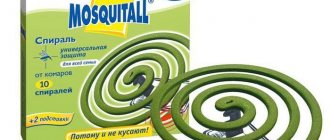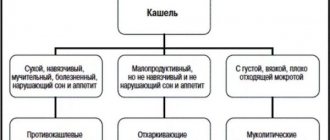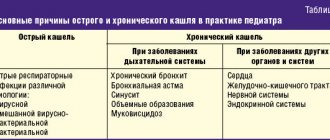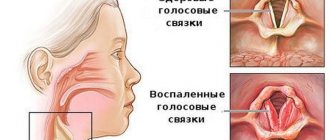The season of flu and colds constantly brings surprises: today you are healthy, capable of moving mountains, and tomorrow you will have swollen eyes, snot, a temperature below 40 and a debilitating cough. Moreover, coughing attacks are sometimes exhausting to such an extent that you don’t know what to drink to feel better right now.
Of course, not only ARVI can cause a cough; there are many reasons, as well as cough remedies. There are enough medications sold in pharmacies, but the choice is complicated by a small nuance - not all of them are good if a woman is breastfeeding. How then to treat cough while breastfeeding is high on the agenda for many nursing mothers.
Causes
There are two types of cough:
- dry, unproductive, that is, not bringing relief and without sputum production;
- wet productive – passes with sputum.
The reasons that cause a cough in a nursing mother may be different, but one thing you need to know for sure is that it needs to be treated. Otherwise, an advanced disease may have far from rosy prospects and consequences. The main causes of cough include the following:
- All colds that are accompanied not only by cough, but also by snot and fever. Diseases of this nature are caused by pathogenic bacteria. And untimely treatment or unwillingness to be treated (I’m a nursing mother!) can ultimately result in bronchitis in a nursing mother, well, if not chronic.
- Viral infections. As a rule, they begin with a dry cough, and after a couple of days it turns into a wet cough.
- Cough of an allergic nature. It is relevant during the flowering period of plants, but can also be caused by dust, intolerance to certain foods, animal hair, and so on. Symptoms of an allergic reaction are watery eyes, congestion, sore throat, cough, and sometimes skin rashes.
- Cough of a different nature, for example, in the presence of chronic heart disease or asthma, as well as cough in heavy smokers.
Types of cough
Cough can be physiological or pathological. The first occurs when it is necessary to remove sputum or foreign objects. The second occurs during the development of the disease. It can be acute - up to 2 weeks, protracted - about a month, subacute - up to 2 months, and chronic - more than 2 months.
Cough is one of the initial signs of a viral respiratory infection or allergy. It can be wet or dry. Any type of this symptom needs prompt treatment.
A dry cough indicates respiratory diseases. Wet, on the other hand, rather indicates that the pathology is developing into a new stage. Cough is the body’s defense mechanism against the activity of microbes. Moist allows you to remove phlegm from the lungs. Dry is not so productive and is nothing more than a normal reflex.
How to treat a cough in a nursing mother: general principles
Cough is the first sign of incipient ARVI during hepatitis B. As a rule, it responds well to treatment at the very beginning. And coughing is a kind of defense of the body, which is trying to get rid of pathogenic bacteria and viruses in this way. But some mothers begin to panic, because any treatment means, first of all, taking a medicine that will end up in the milk. But medicine is different from medicine. For a slight cough in a mild form, herbal preparations are prescribed, the safest for breastfeeding, which are good for treating not only dry cough, but also wet ones.
If it's dry
Cough while breastfeeding can be cured fairly quickly if you consult a doctor immediately. The doctor will select gentle therapy. In addition to tablets, there are a variety of herbal syrups, sprays or, for example, lozenges that are good for coughing and mild incipient coughs.
At home, inhalation with a nebulizer based on mineral water is very helpful for dry cough. After such procedures, the cough becomes a little moist, and sputum discharge improves. Such inhalations can also be done with cough medicines, but only as prescribed by a doctor. You can treat a cough with mustard plasters. Dry heat makes coughing more productive. If you have a dry cough, it is recommended to drink plenty of fluids, as it promotes the formation of phlegm.
If the cough is wet
As a rule, a wet cough appears a couple of days after the onset of the disease. During this period of cough treatment, a nursing mother is advised to drink plenty of fluids and take expectorants for better sputum discharge. The more often the expectoration process occurs, the faster the improvement occurs. The body actively gets rid of “harmful mucus.”
If the discharge begins to turn yellowish-green or brownish in color, this indicates a bacterial infection. In this case, the doctor may prescribe antibacterial therapy for cough during lactation.
The best folk recipes
Warm milk with honey is an effective cough remedy
Traditional medicine uses a rich arsenal of herbal cough medicines (many of them are effective and adopted by official medicine):
Compresses and inhalations
Inhalations can be carried out in the absence of fever
The use of inhalations to treat cough allows the drug to be delivered directly into the respiratory tract, avoiding systemic side effects. The easiest way to carry out the procedure is to dilute essential oils or decoctions of medicinal herbs in hot water, cover your head with a towel and inhale the vapors of the resulting mixture until it cools down. This method carries the risk of burning the mucous membrane of the respiratory tract.
A safer and more effective way is home inhalers (“Chamomile” and similar devices). In them, the container for the medicinal solution is separated from the cap by a filter, which reduces the risk of burns, but the principle of the procedure remains the same.
The most modern way of inhalation is a nebulizer.
This is a special device that allows you to spray a medicinal solution, improve its penetration into the respiratory tract, while reducing the loss of medicinal vapors, which allows you to use the solution more economically.
Compresses on the chest, back and neck are used as a symptomatic remedy. They have a warming effect, increase blood circulation in the area of inflammation, and promote more intense sputum production. To carry them out, alcoholic tinctures of medicinal herbs, mustard, red pepper, honey and propolis are used. The procedure should be carried out with caution, as there is a risk of chemical burns to the skin.
Approved medications for breastfeeding
The situation is complicated by the fact that nursing mothers are not allowed to take all medications. Even herbs during breastfeeding end up in milk. Therefore, the choice of medications is a responsible issue.
Pills
The most basic thing you can take while breastfeeding is cough tablets, such as mucaltin or thermopsis. These drugs thin the mucus. They are of plant origin, so they are relatively safe for a nursing mother. Or Lizobakt tablets - to relieve sore throat and eliminate sore throat. The peculiarity of Lizobakt is that the tablets need to be dissolved. To soften the throat and eliminate soreness, you can use herbal lozenges, such as Adjisept.
Syrups
To treat dry cough, nursing mothers may be prescribed cough syrup with natural ingredients. For example, Gerbion, Gedelix or Prospan. It is also possible to take syrups that contain ambroxol, a substance approved by WHO for breastfeeding.
Sprays and rinses
Regular rinsing with furatsilin tablets will help you cope with sore throat and sore throat during lactation. If the cough during lactation is of a bacterial nature, Hexoral rinse solution is suitable. This medicine is also available in the form of a spray and helps eliminate bacterial microflora of the larynx. An excellent and safe throat spray for kids is Chlorophyllipt. Its main component is an extract from eucalyptus leaves. If you are still afraid of your baby's allergic reaction, Chlorophyllipt is available in several dosage forms, including a rinse solution. But the advertised Tantum Verde spray is contraindicated when breastfeeding.
Inhalations
During lactation, the safest way to get rid of a cough or sore throat is to inhale with a nebulizer. The fine spray of the device allows the medicine to penetrate quickly and deeply into the lungs. Ambrobene-type medicines intended specifically for such procedures are used as a therapeutic agent, but it is also possible to use mineral water and a decoction of medicinal herbs (only be sure to be well strained). The only thing that is absolutely not suitable for a nebulizer is oil-based medications.
Inhalation can be carried out over a pan of boiling water, dropping a few drops of mint or eucalyptus oil into it, or you can breathe in the steam of boiled potatoes (just don’t be fanatical, don’t get burned).
Herbs
Perhaps the most harmless option when treating a cough in a nursing mother is to use traditional methods. For example, decoctions of rosehip or chamomile will be useful not only for the mother, but also for the baby. In general, you can drink them constantly, since rose hips strengthen the immune system, and chamomile is an excellent antiseptic and sedative.
In any pharmacy there are medicines based on thyme, thyme, ivy or licorice roots to relieve attacks of dry cough. Of course, all herbs, especially if they are breastfeeding, must be taken with caution, because they can also be very allergenic and it is unknown how the baby will react to this or that composition.
Folk remedies to alleviate the disease
Traditional methods of treatment are especially relevant and effective in the first days of cough. You may not have to resort to medications if you start therapy using methods that are safe for the baby and have been known for a long time.
Gargling
Infusions of calendula and chamomile are suitable for rinsing:
Gargling with soda and iodine has a positive effect on a sore throat:
The rinse solution must be prepared immediately before use. It is also important that the soda is fresh - the product expires and loses its properties within a month after opening the package.
Drink
Hot teas with raspberries, linden, sea buckthorn, and lemon will help the body replenish the lack of vitamin C, warm a sore throat, and deliver much-needed fluid during illness. At the same time, you do not need to force yourself to drink tea that is too hot - the main thing is that its temperature is not lower than body temperature. This is necessary so that the liquid is quickly absorbed by the body.
It is worth considering that citrus fruits can cause allergies in the baby, so they should be used with caution.
Compresses
If the body temperature is not elevated, it is advisable to use warm compresses. Mustard plasters or boiled potatoes, mashed with a fork and wrapped in cotton cloth, are suitable. The heat source is applied to the upper chest or back in the lung area. Remember, when applying compresses, you should avoid the area of the heart and spine.
You can also warm your feet by immersing them in hot water for 10–15 minutes or pouring dry mustard into woolen socks, which should be put on before bed.
You can also stimulate the discharge of sputum with the help of cups. However, they need to be installed carefully; here you will need the help of a person with experience.
Milk
To treat a cough, milk should be drunk hot, with the addition of butter. If the baby does not have allergies, you can supplement the drink with honey.
You can also consume milk with chopped garlic or a pinch of baking soda.
Massage
If you have a wet cough, tapping on your shoulder blades will help relieve mucus. You should lie on your stomach on a flat surface. Using the edge of your palm, the assistant “beats off” the mucus by tapping on the back. It is important not to overdo it - the massage should not cause physical discomfort or pain.
What should a nursing mother do with bronchitis?
Cough must also be treated because untreated inflammation can lead to chronic bronchitis. Bronchitis during breastfeeding can negatively affect lactation (milk production will decrease) and the child’s psychological comfort (few people will like a mother who is constantly coughing loudly). And even if you take antibiotics, even those approved for breastfeeding, the baby develops dysbacteriosis.
Therefore, if you have tried all possible methods, but the cough still does not go away, you should consult a doctor to prescribe adequate treatment. As a rule, the doctor recommends expectorant medications, which, in case of inflammation of the bronchi, help thin mucus in the respiratory tract and remove it. Very often, doctors recommend Bromhexine; it is low-toxic and has no contraindications for breastfeeding. Or Lazolvan, which penetrates into milk, but does not cause significant harm to the child.
Treatment tactics for bronchitis during breastfeeding will depend on the nature of the inflammation. If bronchitis in a nursing mother is bacterial in nature, then antibiotics are no longer necessary. For hepatitis B, medications from the group of penicillins, aminoglycosides, and cephalosporins are allowed. All of them penetrate into milk, but in small doses. May cause intestinal problems and allergies. Therefore, you have to weigh the benefits and risks.
Should I continue breastfeeding?
Worried about the health of the baby, many sick mothers stop breastfeeding. This should not be done; the child will not become infected through milk. Moreover, it contains antibodies specifically against the infection that mother is suffering from. A few days after the onset of the disease, the body of a nursing mother begins to produce interferon, and after 5 days, antibodies are produced that kill viruses.
A child can catch the infection through the mother’s hands and through airborne droplets. Milk will become the “medicine” that will prevent the infection from spreading, it will strengthen the child’s immunity.
You can take a temporary break only if you take antibiotics (and even then not all of them) during breastfeeding. In all other cases, feed for health and do not deprive the baby of pleasure.










